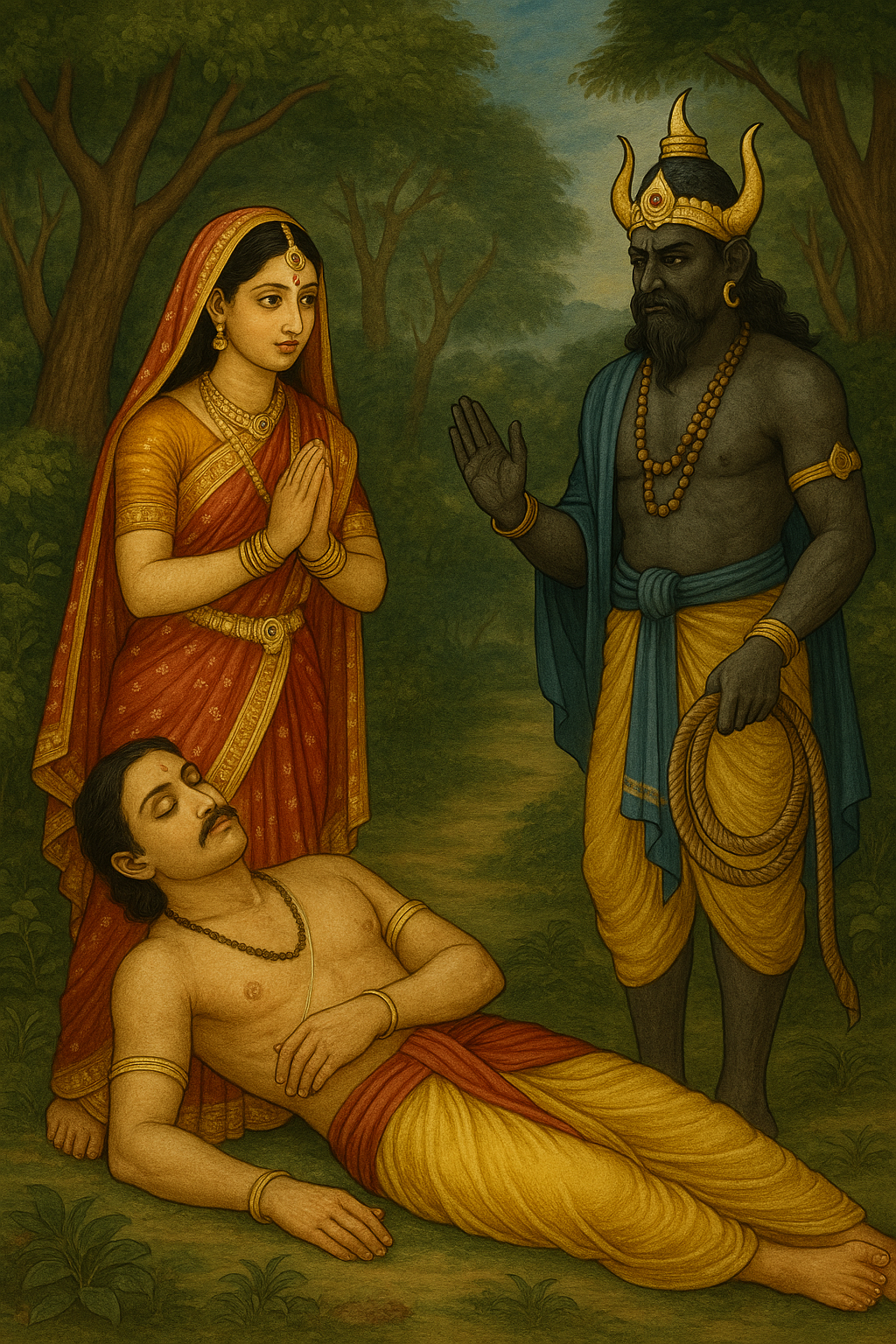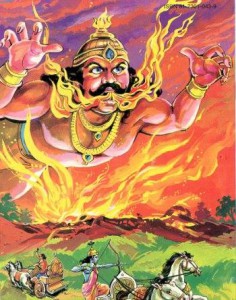A Pious King’s Austerity for a Child
King Aśvapati of Madra was a pious monarch known for his devotion to the brāhmaṇas and strict observance of dharma. Despite having wealth and fame, he was distressed by his lack of offspring. Choosing not to lament, he performed intense austerities, including daily offering ten thousand oblations and worshiping Goddess Savitrī for eighteen years.
The Birth of Savitrī and Her Unmatched Virtue
Pleased by his tapasya, Goddess Savitrī blessed him with a divine daughter, not a son. Though initially disappointed, the king accepted the boon. The daughter, named Savitrī, grew into a radiant, virtuous woman whose inner and outer beauty intimidated suitors. Her father then advised her to find a husband herself.
Savitrī Chooses Satyavān
Savitri selected Satyavān, the exiled son of blind King Dyumatsena, as her husband. The sage Nārada warned that Satyavān was destined to die within a year, but Savitrī refused to change her decision. Her chastity, loyalty, and unwavering determination astonished even the great sage, who then endorsed her choice.
Savitri’s Austerities and the Fateful Day
As the fatal day approached, Savitrī undertook severe fasting and vrata. On the destined day, she accompanied Satyavān to the forest, suspecting that death was near. After Satyavān fell unconscious, Yamarāja, the god of death, appeared and seized his soul.
Dialogue with Yamarāja: Wisdom Defeats Death
Savitri followed Yamarāja, offering profound words of dharma, devotion, and the glories of saintly association. Pleased with her wisdom and virtue, Yamarāja granted her four boons: the restoration of her father-in-law’s sight and kingdom, a hundred sons for her father, and a hundred sons for herself.
Finally, Savitrī pointed out that the last boon required her husband’s life to be fulfilled. Yamarāja, defeated by her devotion and intelligence, restored Satyavān to life and praised her exalted character.
The Fulfillment of All Boons
Satyavān and Savitrī returned to their ashram. Dyumatsena, who had regained his sight, was overjoyed. The people of the kingdom came and restored him to the throne. In due time, all the boons were fulfilled—Savitri gave birth to a hundred sons, and peace and prosperity returned.
Lessons to Be Learned
1. Chastity and Devotion Are More Powerful Than Death
As Bhaktivinoda Ṭhākura teaches, a soul surrendered fully to dharma and divine love becomes spiritually invincible. Savitrī, a woman of pure character and unbreakable loyalty, conquered even Yamarāja through her śuddha-bhakti (pure devotion). Similarly, a devotee firmly fixed in the service of the Supreme Lord cannot be overpowered by material nature or death.
2. Determination in Dharma Attracts Divine Intervention
Śrīla Prabhupāda emphasized that niṣṭhā, or determined devotion, is the key to success in both spiritual and material life. Savitrī’s unwavering decision to marry Satyavān despite knowing his impending death is a lesson in surrender and trust in the Supreme. She exemplifies the bhakta’s fearless adherence to duty.
3. Sweet Speech, Humility, and Service Win the Heart
Savitri’s respectful and dharmic behavior won over Yamarāja, just as the Lord becomes conquered by the humility and sincere prayers of His devotee. Bhakti is not about force, but sweetness (mādhurya), humility (dainyata), and surrender (śaraṇāgati).
4. The Power of Austerity and Self-Control
Bhaktivinoda Ṭhākura explains that sense control (indriya-nigraha) and vrata (spiritual vows) purify the heart and attract higher grace. Savitri’s fasts, celibacy, and self-discipline empowered her to gain divine boons and bring back her husband from the grasp of death.
5. Associate with the Saintly
Savitri glorified saintly association as the root of all good fortune. Indeed, the company of sādhus purifies the heart, just as the presence of a chaste and devoted wife sanctifies the home. This principle, highlighted by both Śrī Caitanya Mahāprabhu and our ācāryas, is a foundation of spiritual upliftment.



